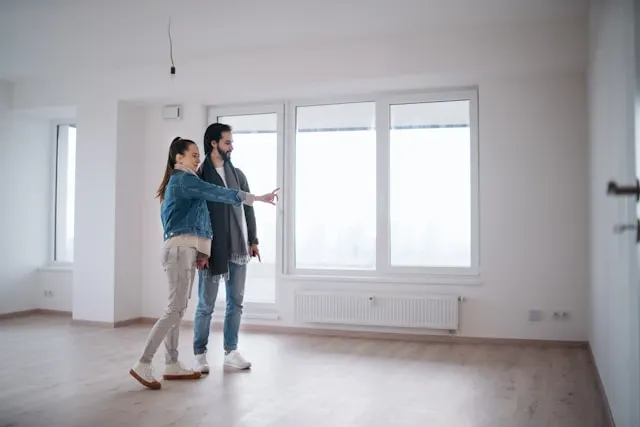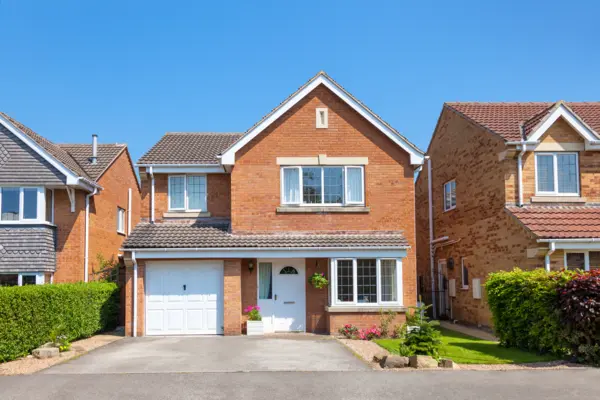Guide to First Time Buyer Mortgages
First time buyer mortgages information and help from Go Direct, UK mortgages explained, mortgage calculators, mortgage income multipliers and mortgage advice.
Where Should a First-Time Buyer Start?
If you are a first-time buyer, no doubt you will have a lot of questions to ask. Should I go to a bank, a building society or a specialist lender? Should I opt for a fixed rate, a capped rate, a discount or a tracker? How much can I borrow, and how much will it cost me?
Go Direct contains a number of mortgage calculators that instantly tell you what your monthly repayments would be on any given mortgage, so they provide a useful starting point.
And remember, there are plenty of specific first-time buyer mortgages out there these days, including shared ownership, guarantor mortgages, 100%- Higher Lending charge may apply (or no-deposit). Mortgages are also available for Key Workers, and in some instances you can buy with a Housing Association. If you want an idea of the interest rates available, check out our best buy tables.
Establish your Monthly Budget
As first time buyers it is important to sit down and calculate how much you can afford to spend on your new mortgage and insurance costs before you start looking at homes. Try Go Directs mortgage budget planner to see how much you can afford for your first mortgage. If you live with family it always pays to work out how much utility bills and average council tax bills will be.
Which Mortgage Type is Right for a First Time Buyer?
Knowing which is the best type of mortgage for your needs is never easy, do you fix your mortgage, take a flexible mortgage, a tracker/discount or link your current account to the mortgage. Try our mortgage decision tree to find the best type of mortgage for you.
First Time Buyer Mortgage Borrowing
Once you have an idea of the type of mortgage yoiu want you can start looking at how much can you borrow on a new mortgage. The are two ways that mortgage lenders work this out, Affordability or income multipliers, for more details see how much can I borrow section.
How does Mortgage Protection Work
Many first time buyers overlook the cost of protecting their mortgage, by working out which mortgage protections you need before you apply for your mortgage you can avoid overstretching your budget. For more information on protecting your mortgage look at our Mortgage Protection section.
First Time Buyer Mortgage Advice
If You would like to speak to an mortgage advisor about how much you can borrow please contact us for first time buyer mortgage advice.
Your home may be repossessed if you do not keep up repayments on your mortgage
First Time Buyer House Purchase Tips
Once you have an idea of how much you can afford and how much a mortgage lender will lend you, the fun of finding your first home can begin.
Step 1 - Contact all the Local Estate Agents
Dont just rely on the online property sites like Rightmove and Zoopla. Most, if not all, estate agents have mailing lists or contact lists, especially for those all important First Time Buyers. They will require your contact name, address and telephone numbers as well as your main requirements for your new purchase. When contacting estate agents remember to be positive and assertive. Bear in mind, the quicker you make them your friend, the more likely you are to hear about your perfect home. They may even start to show you properties before they are advertised. As long as an estate agent knows you are 100% serious about buying they will inform you of any new instructions by e mail, phone or even text messaging.
What is a Serious Buyer
Your typical estate agent class a serious buyer as someone who is actively viewing homes and is in a position to make an offer on a home when they see one they wish to buy. Now days most estate agents expect you to have an Agreement in Principle with a mortgage lender before you offer on a property. A mortgage agreement in principle is when a mortgage lender has taken down your name, 3 year address history, employment details, salary, credit commitments and run a credit score. This establishes whether you are a low or high risk to the mortgage lender to default on your mortgage. Many mortgage brokers will help you to get an agreement in principle, if you would like Go Direct to get you a mortgage agreement in principle just complete our mortgage inquiry form and we will contact you free of charge to discuss your mortgage needs.
Groundwork for First Time Buyers
Consider carefully what kind of property you would like and need. Would you prefer a garden or is city living more your style? How many bedrooms would you like or require? Do you need parking or are there any over riding factors which you need more than others? If you have a clear idea of your likes and dislikes, so will the estate agent.
Exploring
As well as contacting all the local estate agents its worth searching online. This means you can do it at any time of day at your leisure and if facilities are available means you can normally print property details from the websites. Most estate agents have websites and they will list all the properties they have available.
Viewing Properties
Allow yourself plenty of time to find the right property, even if it takes a number of months. It is a big investment and you will need to be sure about your purchase. You will only be sure on your eventual purchase by viewing as many properties, in your price range, as possible to give you a clear idea of what is available and to verify your requirements. Compare and contrast all the properties you view
It is always a good idea to drive or to have a walk around the area before or even after any viewing, just to get a feel for the neighborhood. Is it close enough to any amenities, schools, or even work for you? Can you see yourself living in the area?
Once you have made a definite decision on the area you wish to live in , take a look at Zoopla to find out more about the area and re contact the estate agents to let them know as they could concentrate on that area for you.
What about New Build Properties?
Many buyers prefer newly built properties. Not only because you will have all new fittings and the property has not been lived in before, but also due to that they will be very little, if nothing, to do to it. Always ensure that the builder offers a buildings warranty scheme to protect you in the future if any problems arise with the new build.
Reserving off plan
In some cases a property can be reserved and exchanged on before it is even built, even if it is a long time before the building is due to be completed. In other words you are only able to view and purchase the property or plot from a plan. The property is called the “plot” as it has no postal address. Builders or agent details will inform you of plot numbers and you would be able to reserve a plot.
Freehold and Leasehold Properties
There are 2 main ways of holding your property. Majority of houses are freehold properties, whereas flats or apartments are normally leasehold.
Freehold
A Freehold means that you own the property and the land that it stands on, giving you total ownership. If you own a freehold property don’t forget the building and contents insurance
Leasehold
A Leasehold means you own a property for a number of years outlined in the lease, which is a legal document.. When the lease expires, the property returns to the freeholder. If you purchase for a leasehold property make sure the lease is as long as possible as most lenders are unable to lend if the lease expires in less than 60 years. Also, bear in mind that you may have additional costs such as Ground Rent, payable to the freeholder and maintenance charges which the estate agent should be able to make you aware of.
Step 2 - Once you Have Found
Once you have found your property, before you make an official offer, give the place a very thorough once-over inside and out. Even if it means arranging another viewing.
It is a good idea to take a friend or family member along to give an unbiased second opinion. Try to view during the day and at night. Don't worry if you miss anything - you'll be able to arrange for the property to be mortgage surveys
One last thing before you make an offer is to establish whether the asking price is fair and is the market value. All too often potential purchasers fail to agree with the suggested selling price, due to a myth that you should offer 5% less than the figure stated. To confirm the valuation of the property we would recommend you use our house price comparison service where you can enter the postcode of the property and obtain a report on properties which have sold in that area to gauge how much the property is worth. It is also important to remember that the estate agent acts for the vendor of the property and will always be trying to obtain the optimum sale price for their client.
Once you have your decision and you have found your ideal home it is now time to contact the estate agent and make an OFFER!
Surveying the property
Once you have made an offer and had it accepted it is now time to get your mortgage confirmed. Contact your mortgage advisor or lender to discuss your mortgage options and agree on the right mortgage to match your needs.
The property will need to be professionally checked out by the mortgage lender with at least a mortgage valuation, not only for your own peace of mind, but any lender will need a valuation to convince them that it is a suitable mortgage security.( For further information on the main types of valuations or surveys please utilize this link Mortgage Surveys)
If the valuation doesn't confirm the purchase price the Mortgage lender may reconsider lending. Which may mean that you could either submit a lower offer, or if this is not acceptable perhaps having to change your purchase to another home.
A surveyor may consider that the property is worth the value but with additional works or improvements, but not in the condition it is in at present, which may mean that the lender will retain some of its finance. Once the work is carried out after completion, and after additional inspection, they will then forward on the retained monies. This, therefore, means that any sum retained needs to be found from another source in order to complete on the property but will be reimbursed once the work is finished.
Deciding on a Conveyancer
A conveyancer or solicitor will be required to carry out and complete the legal work for you. It is a professional who you should be able to depend on and trust and they will be the person who confirms all aspects of the legal title and legally transfers your new purchase into your name. Before deciding on you legal representative just check to ensure they are on your lenders panel of conveyancer they will liaise with.
For further details on Conveyancing and what is actually involved please see our Conveyancing section and Conveyancing Guide .
Insurance
Buying and owning your own home are big commitments and it's very sensible to take precautions in case things go wrong. Make it a priority to arrange cover as soon as possible. The main types of insurance you should consider when buying a property are:
In the majority of cases, your mortgage provider will make it a condition of your mortgage offer that you take out buildings insurance.
Remember that cheaper is not always better - make sure the cover is sufficient for what you need, and must start on exchange of contracts
Stamp Duty Land Tax
One of the main costs involved in purchasing is the stamp duty land tax payable to the government on most, but not all, properties. Don’t forget to leave a space in your budget for this cost. The estate agent or conveyancer will be able to inform you if stamp duty is payable and at what price.
Stamp Duty is calculated as follows: Up to £250,000 (£450,000 for FTB'S) = Nil, £250,000 - £925,000 = 1%, £925,001 - £1,500,000 = 10%, £1,500,001 - and over = 12%.
For additional properties and second homes stamp duty is higher. If you would like an accurate figure please try our stamp duty calculator.
Correct as of 01/06/2024
Once contracts have been exchanged get ready for the moving day. With years of experience in the mortgage market we have complied a list of moving tips for you.


